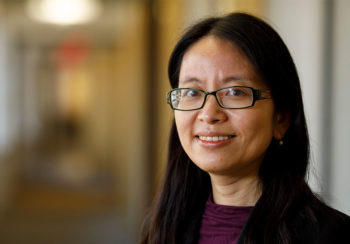Each day, Chelsea Hood makes it a priority to ensure the well-being of kids under the care of the Cobb County Division of Family and Children Services, which investigates about 4,000 child welfare referrals per month.
To do her job as a case manager, Hood uses her master’s degree in social work. But she also knows from personal experience what it’s like for a child to endure hardship.
Hood’s mother, Sanora, who divorced Chelsea’s absent father when Chelsea was 9 months old, held down two jobs. For much of Chelsea’s childhood, her grandmother took care of her. Chelsea had no consistent male perspective for advice about boys and dating as she entered her teen years.
“It was hard for Chelsea to relate to where I was coming from,” Sanora said. “She needed a father figure in her life, something to help her deal with peer pressure and communication.”
One day, Chelsea’s mom received an invitation in the mail to participate in a prevention program called Strong African American Families (SAAF), which, 15 years later, researchers say has helped lessen the negative impacts of poverty on children’s health and brain development. The results of the study were published in 2017 in the Journal of the American Medical Association Pediatrics.
Strengthening families
The Hoods were among the first families to participate in the SAAF program, which Gene H. Brody, Regents Professor of Human Development and Family Science, and his team developed in 2001.
SAAF was based on 10 years of research by Brody. He has dedicated his career to studying the pathways that lead children who grow up in challenging economic and social environments to do well at school, at home and in their communities.
With funding from the National Institutes of Health, a randomized trial of SAAF was conducted with 667 African-American children and their families living in rural Georgia. Many of the families are still involved in data collection, said Brody, co-director of the UGA Center for Family Research. The young people—age 11 at the start of the study—are now age 26.
Over the course of the study, Brody’s team began to describe features of the families’ lives that forecast academic achievement, good mental health, and supportive family and peer relationships despite growing up in the midst of economic challenges and exposure to racial discrimination.
Beginning when the participants were age 19, the researchers expanded their data collection to include blood and urine tests. This allowed Brody and his colleagues to investigate biomarkers of health, such as metabolic syndrome, levels of stress hormones—cortisol, epinephrine and norepinephrine—and levels of proinflammatory cytokines, which measure inflammation levels.
The results of the study showed that SAAF encouraged family processes that deterred the onset of risky behaviors, such as the use of alcohol and other drugs. Importantly, these deterrent effects persisted for years after participation in the program.
Nurturing relationships
Brody’s recent work showed that the SAAF program safeguards children’s brains from the effects of poverty.
“Our thinking was based on a body of research that showed growing up in poverty has many effects, including overall health across the lifespan, academic achievement and mental health outcomes,” Brody said.
To confirm this hypothesis, Brody’s team built on a 2013 study by scientists at Washington University in St. Louis that examined the brain scans of children in preschool who had the benefit of a nurturing parent. The study found an increase in the volumes of those brain areas that were critical to memory processes and regulating emotions. Informed by this research, the UGA team used MRI scans on SAAF participants to determine the intervention’s effects on the participants at age 25.
In 2014, Brody’s team compared the brain development of 59 adults who as 11-year-olds had participated in SAAF with that of 57 adults with similar backgrounds who did not take part in SAAF. The findings mirrored those found in the Washington University study. Those who had participated in SAAF showed greater volumes in the areas of the brain related to memory, learning, stress tolerance and mood: the hippocampus and the amygdala. The UGA team also found that adolescents who had spent more time in poverty and did not take part in SAAF had smaller volumes of those parts of the brain.
“Having high levels of involvement with children—nurturing, positive and not harsh—against the backdrop of family life that involves lots of routines helps to mold their stress responses,” Brody said. “These children and adolescents don’t experience the same levels of stress when compared with children who don’t have the benefit of supportive parenting.”

Supportive parenting is at the core of SAAF. The program enhanced parental monitoring of the children, clear and consistent rules, consistent household routines, frequent communication, expressions of warmth and love, and parental involvement in their children’s schools.
Sanora Hood remembers learning from the program what to do when behavior problems arose, such as when a child talked back.
“I learned to sit Chelsea down and talk to her in a calm voice,” she said. “I just had to talk to her. She really listened and understood.”
The program strengthened their relationship, and the mother and daughter talk by phone every day, Chelsea said.
“Now we really listen to each other,” she added. “We don’t argue a lot, but when we do, we try to move past the issue. The program helped us get over our issues at a quicker pace.”
Putting skills into practice
The SAAF study involved participants from eight low-income counties in rural Georgia. The prevention measures were implemented in four of the counties, while the other four counties were used as a control. The study required a total of 14 hours of family involvement, which occurred in two-hour sessions over a period of seven weeks.
During the first hour, researchers met separately with parents and children. During the second hour, the parents and their children came together to work on communication and problem-solving.
The children completed questionnaires that assessed their family relationships, use of alcohol and other drugs, behavioral problems, emotional problems and academic achievement.
The second hour was crucial to putting the new skills into practice. A mother-daughter activity that still stands out in Chelsea’s mind focused on communication strategies.
“We had to say two things good about ourselves, one thing we would like to work on ourselves and two things we would like to work on with regard to having a better relationship,” Chelsea said. “At the end, we had to hug each other. It was a tear-jerker; I’m not going to lie.”
“Each session had a specific prevention target, and it was timed down to the second,” Brody said. But he pointed out, “It was very important to us that the participants enjoyed the experience.”
Chelsea grew up in Milledgeville, a small city in central Georgia. She recalls the study fondly. “I did in fact gain more friends, more confidence in myself, and it helped me forgive my father,” she said. “It helped me understand that even though we are estranged now, that doesn’t mean that I have to walk around feeling negative about myself.”
Preparing the next generation of parents
The UGA team continues to collect data on children who participated in the program, including regular check-ins with Chelsea. She earned her master’s degree from Clark Atlanta University in 2016 and plans to return to school for a Ph.D. in developmental psychology.
“I want to be able to give back to kids who may be coming from broken homes or a single-parent household where there are absent fathers or mothers,” she said. “I want to be able to inspire them, give them words of encouragement and give them the resources that they need, so they can be successful as well.”
SAAF now focuses on her life as an adult, monitoring her stress levels, physical health and mental health.
“This project is so interesting just because it catches you at a certain part of your life and carries on,” Chelsea said. “I feel like they still want to know my progress and how I’m doing all throughout my adult life.”
The SAAF findings have far-reaching implications for policy, Brody said. The results give clues that enhancements in parenting influence not only how children think about themselves and how they do in school but also their physical health and brain development.
“If we can conduct programs like this in schools or in the community, as we are now doing in 30 communities around the nation, the benefit to both the parents and the children will be very satisfying,” Brody said. “Parents want to do a fabulous job and to ‘be there’ for their children, and SAAF is a resource that shows them how to do that.”






